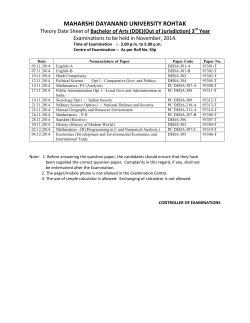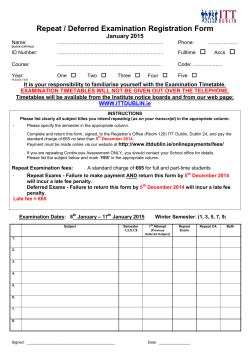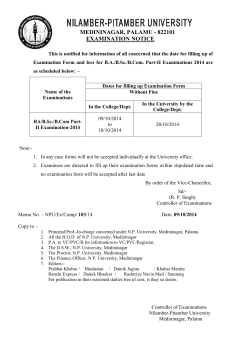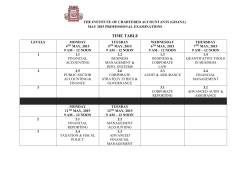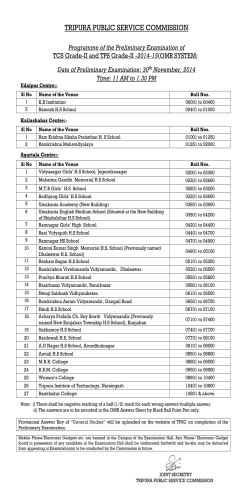
MEDC 126 - College of Medicine
Foundations in Clinical Medicine I MEDC 126.18 TERM 2 COURSE SYLLABUS 2014/2015 Foundations in Clinical Medicine I – Course Overview COURSE DESCRIPTION The Foundations in Clinical Medicine Courses run over Terms 2, 3, and 4 and incorporate the eleven human body systems modules. The four modules explored in the Foundations of Clinical Medicine I (Term 2) Course include: Hematology, Respiratory, Cardiovascular, and Gastrointestinal Medicine. Major vertical themes will be emphasized. Students will be prepared to enter their clerkship where they will expand and deepen their knowledge and skills in these areas. COURSE PREREQUISITES A student must have successfully completed Principles of Biomedical Science (MEDC 115.18) or be conditionally promoted and engaged in a program of remediation for the MEDC 115.18 course as approved by the Undergraduate Education Committee prior to the start of the Foundations of Clinical Medicine I course. OVERALL COURSE OBJECTIVES Building on their knowledge from MEDC 115.18 of normal anatomy, histology and physiology, students will learn to care for patients with common and/or urgent medical conditions by acquiring and applying knowledge and clinical reasoning skills to: Explain the pathogenesis and pathophysiology of the subject conditions, with reference to the divergence from normal anatomy, histology and/or physiology Generate reasonable differential diagnoses and management plans Select and interpret appropriate investigations In addition, each discipline-specific module in the course will also have its own specific module objectives and individual session objectives of learning. COURSE CONTACTS Course Chairs: Dr. Jennifer Chlan - [email protected] (306) 966-6557 Dr. Regina Taylor-Gjevre - [email protected] (306) 844-1145 Administrative Coordinator: Cheryl Pfeifer [email protected] (306) 966-6138 COURSE SCHEDULE The Foundations in Clinical Medicine I Course is organized in 4 modules running sequentially on specific assigned days. Session schedules for each of the modules will be posted in MEdIC on One45. All information relating to this course is available in One45 that can be accessed through the Medical Education Information Center (MEdIC) as well. Please check One45 DAILY to ensure that you have the most current schedule information. COURSE DELIVERY Students will learn through a variety of methods, including: Large group sessions including lectures, interactive discussions, case-based problem solving Interactive small group learning sessions Independent self-directed reading and exercises 2 COURSE MATERIAL ACCESS Course materials are available on MEdIC in One45. The syllabus, forms, and other useful documents will be posted there. If you have not been assigned a user name (NSID – U of S Network Service ID) and password for PAWS, contact Student Central 306-966-1212 or contact IT Services Help Desk 306-966-4817. COURSE POLICY FOR SUCCESSFUL COMPLETION & REMEDIATION As per University of Saskatchewan standards a passing grade is 50%. However, in order for a student to be promoted to Foundations of Clinical Medicine II upon completion of the Foundations of Clinical Medicine I Course (hereafter called “Foundations I”) students must achieve a minimum grade of 70% in each of the four modules within the Foundations I course (Hematology, Respiratory, Cardiovascular and Gastrointestinal Medicine Modules). Students must also achieve a minimum grade of 60% in the end-of-term integrated examination for Foundations I. A student’s grade for each module will be determined at the end of each module and is based on the weighted cumulative average of all graded assessments within each individual module. The requirements for successful completion of the Foundations I Course are listed below. Please note that students must meet the overall Term 2 promotion standards in order to be promoted to Year 2 (see Student Information Guide): A) Students will be considered to have successfully completed the Foundations I Course if they have achieved a minimum 70% average grade in each of the four modules and a minimum 60% grade on the end-of-term Foundations I integrated examination. B) Students who have not received the required 70% average grade in any of the four modules or a 60% grade in the end of term integrated examination will be deemed to be experiencing academic difficulty. The severity of academic difficulty will be based on a weighted grade deficit assessment (see Table 1 for grade deficit point allocation rubric). Students accumulating 2 or more deficit points at any point in the course will be required to meet with a course sub-committee of at least 3 people (made up of Course Chairs(s); relevant Module Director(s); Year Chair or designates) to discuss ways to improve academic performance. The goal of such a meeting is not meant to be punitive, but should be student-centered, and focused on the success and well-being of the student. With any further accrual of deficit points, the student will be required to again meet with the course sub-committee. C) Students who are identified as being in academic difficulty as defined in (B) above may potentially be offered remediation for the modules or the integrated examination for which they did not achieve the standard. This remediation will be in the form of additional assignments and/ or supplemental examinations as determined by the module director and/ or course chair(s). The determination of eligibility for either type of remediation will be based on a weighted grade deficit assessment (see Table 1 for grade deficit point allocation rubric). Students will be offered remediation up to and including the point where they have accrued a maximum of five grade deficit points for Foundations I. Supplemental assignments and/ or supplemental exams will be written as arranged between the student, module director and/ or course chair(s). These supplemental assignments and examinations should be written within one month after the completion of final examination period, unless otherwise arranged by the student and the Course Chair(s). D) Students who have accrued six or more grade deficit points will be considered to have been unsuccessful in the Foundations I Course and will NOT be offered supplemental assignments and/ or examinations as per usual course policy. Further decisions regarding academic outcomes will be adjudicated by the Year I Term II Promotions Committee and the Undergraduate Education Committee. E) Students who have not achieved the required 70% average grade in each of the four modules and a 60% grade in the end of term integrated examination and who have written a supplemental examination, but who still have not achieved the required standard, will be required to meet with the Course Sub-Committee to determine a course of action, which may include additional opportunity to remediate as defined in Section (C) (depending on number of grade deficit points accrued and any other mitigating factors); or may include a decision that the student has been unsuccessful in the course and will NOT be offered further supplemental examinations. If the failure of a supplemental examination occurs during or after the final examination period, this decision will be adjudicated by the Promotions Committee and the Undergraduate Education Committee. F) Success in supplemental assessment will be accorded a maximum grade equivalent to the minimum requirement for that component of the course (70% for a Module and 60% for the end-of-term integrated exam). 3 G) Students are required to complete all assignments, quizzes, and examinations in each of the four modules, as well as the integrated examination. A mark of 0% will be given for any missed assignment, quiz, or examination, unless otherwise arranged as per the College of Medicine Attendance Policy and Deferral Policy. . Students who are eligible for supplemental examination will be contacted by the Module Director and should arrange to meet with the Module Director or designate to discuss educational issues and develop a learning plan. Table I: Grade deficit point allocation Overall grade achieved in module before remediation Average 69-60% Average 59-50% Average <50% Haematology Module I II III Respiratory Module I II III Cardiovascular Module I II III Gastrointestinal Module I II III Integrated Examination N/A II III I: one grade deficit point; II: two grade deficit points; III: three grade deficit points; N/A: not applicable IMPORTANT AND RELEVANT STUDENT INFORMATION The following information is extremely important for your success in the Foundations of Clinical Medicine I Course and in your medical education in general. To avoid duplication and ensure clarity, please refer to the Student Information Guide or UGME website for the following policies and information: COLLEGE OF MEDICINE CONTACTS ATTENDANCE POLICY PROFESSIONALISM POLICY ACADEMIC INTEGRITY POLICY EXAMINATION POLICIES AND EXAMINATIONS WITH DISABILITIES SERVICES FOR STUDENTS (DSS) LIST OF IMPORTANT DATES OFFICE OF STUDENT AND RESIDENT AFFAIRS COMMUNICATION TOOLS GUIDELINES FOR PROVIDING FEEDBACK EXAM REVIEW POLICY 4 Foundations in Clinical Medicine I – Module Syllabus This section of the course syllabus will describe the specific objectives, requirements and expectations, and assessment procedures for each module within the Foundations in Clinical Medicine I Course. MODULE 1 Hematology MODULE DIRECTOR Dr. Rebecca MacKay Email Address: [email protected] Phone Number: 306-655-0655 Office Location: Saskatoon Cancer Center, CM 401.2 Office Hours: varies, please contact by telephone or email in advance to arrange meeting Assistant Module Directors: Dr. Julie Stakiw Dr. Kelsey Brose Email Address: [email protected] Email Address: [email protected] Phone Number: 306-655-2980 Phone Number: 306-655-1483 Office Location: Saskatoon Cancer Center, CM 401.2 Office Location: RUH 2609 Office Hours: please contact for meeting Office Hours: please contact for meeting MODULE DESCRIPTION Hematology is the study of blood and blood diseases. This module will include the study of the physiology of blood/hematologic system components in addition to the pathophysiology, diagnosis, prognosis and treatment of blood related diseases. Through lectures, cases and assignments, students will develop a clinical approach to common hematologic problems including anemia, bleeding disorders, hereditary and acquired thrombotic disorders, lymphadenopathy, splenomegaly, hematologic malignancies and transfusion medicine. GENERAL MODULE OBJECTIVES By the completion of this module, students will be able to: Construct a differential diagnosis in a patient presenting with hematologic related abnormalities Order appropriate laboratory investigations and be able to interpret them Outline a management plan for patients with a hematological disease/disorders Explain the pathogenesis and pathophysiology of common or urgent hematologic disorders Note: Students should also refer to overall Foundations I Course objectives within this syllabus. Additionally, for each module, detailed individual lecture and session objectives will be posted in One45. Please take care to review in advance. MODULE SCHEDULE All information relating to this course is available in One45 that can be accessed through the Medical Education Information Center (MEdIC) as well. Please check One45 DAILY to ensure that you have the most current schedule information. 5 REQUIRED RESOURCES HemeTeam website: www.hemeteam.com [This is a free of charge educational website which includes information of pathogenesis, manifestations and treatment of common blood diseases, as well as approach to common problems and case studies] Further individual session resources and pre-readings may also be posted within One45. Supplemental Resources: (on reserve at the Leslie and Irene Dubé Health Sciences Library) Hematology in Clinical Practice (McGraw-Hill Medical, 5th edition) Essential Hematology (Wiley-Blackwell, 6th edition) Note: Student pre-reading is required in this module. Students are strongly encouraged to come to class prepared to actively participate in the educational sessions. MODULE DELIVERY Students will learn through a variety of methods, including: Large group didactic, interactive and case-based problem solving sessions Interactive small group learning sessions Independent self-directed reading and exercises STUDENT ASSESSMENT Quizzes x4 (each worth 12.5%) 50% End of Module Examination 50% If you must be absent for a quiz, you must inform the College of Medicine Office prior to the quiz as per the procedure outlined in the Attendance Policy . If they accept your reason for absence, the value of that quiz will be added to your final exam mark. Please refer to overall course promotion/failure/remediation standards outlined earlier in this syllabus. 6 MODULE 2 Respiratory MODULE DIRECTOR Dr. Donna Goodridge Email Address: [email protected] Phone Number: 306-844-1469 Office Location: Ellis Hall, Room 543 Office Hours: please contact in advance to arrange a meeting MODULE DESCRIPTION This module will include the study of respiratory related physiology in addition to the pathophysiology, diagnosis, prognosis and treatment of respiratory related diseases. Students will develop a clinical approach for patients with common and urgent thoracic/respiratory system problems including upper and lower airway, pleural and parenchymal disease/disorders/trauma/malignancies. Major vertical themes will be emphasized including public health implications related to respiratory diseases. GENERAL MODULE OBJECTIVES By the completion of this module, students will be able to: Construct a differential diagnosis in a patient presenting with airway/thoracic/respiratory abnormalities Order appropriate medical investigations and be able to interpret them Outline a management plan for patients with an airway/thoracic/respiratory disease/disorder Explain the pathogenesis and pathophysiology of common or urgent respiratory/thoracic diseases/disorders Note: Students should also refer to overall Foundations I Course objectives within this syllabus. Additionally, for each module, detailed individual lecture and session objectives will be posted in One45. Please take care to review in advance. MODULE SCHEDULE All information relating to this course is available in One45 that can be accessed through the Medical Education Information Center (MEdIC) as well. Please check One45 DAILY to ensure that you have the most current schedule information. REQUIRED RESOURCES (On reserve at the Leslie and Irene Dubé Health Sciences Library) Respiratory Physiology: The Essentials, by John B. West 9th edition (2011) Pulmonary Pathophysiology: The Essentials, by John B. West 8th edition (2012) Additional resource materials recommended to students include: Online lectures by J.B. West: https://www.youtube.com/playlist?list=PLF6EB599968CCB06B Internal Medicine reference textbook (Harrison’s Principles of Internal Medicine 18th ed. Or Cecil’s Textbook of Medicine 24th edition) Harrison’s Principles of Internal Medicine 18th ed. (University of Saskatchewan Library E- book link provided) http://library.usask.ca/scripts/remote?URL=http://www.accessmedicine.com/resourceTOC.aspx?resourceID=4 Or Cecil’s Textbook of Medicine 24th edition (University of Saskatchewan Library E-book link provided) http://library.usask.ca/scripts/remote?URL=http://www.mdconsult.com/public/book/view?title=Goldman:+Goldman's+ Cecil+Medicine 7 Further individual session resources and pre-readings may also be posted within One45. Note: Student pre-reading is required in this module. Students are strongly encouraged to come to class prepared to actively participate in the educational sessions. MODULE DELIVERY Students will learn through a variety of methods, including: Large group didactic, interactive and case-based problem solving sessions Interactive small group learning sessions, Independent self-directed reading and exercises, Histology laboratory experience with virtual microscopy slides and access to the histology study room STUDENT ASSESSMENT Assignments (Histology component) 5% Respiratory KBIT On-Line Case Completion 5% Assignments (clinical cases – 10 cases x 2%) 20% Part I Exam (February 10, 2015) 35% Part II Exam (March 3, 2015) 35% Please refer to overall course promotion/failure/remediation standards outlined earlier in this syllabus. 8 MODULE 3 Cardiovascular MODULE DIRECTOR Dr. Jeffrey Stein Email Address: [email protected] Phone Number: 306-655-6851 Office Location: RUH 3670 Office Hours: please contact to arrange meetings MODULE DESCRIPTION This module will include the study of cardiovascular related anatomy and physiology in addition to the pathophysiology, diagnosis, prognosis and treatments of cardiovascular related diseases. Students will develop a clinical approach for patients with common and urgent/emergent cardiac and vascular related problems including central and peripheral vascular, endomyocardial, valvular, pericardial and electrophysiologic disease/disorders. Major vertical themes will be emphasized including preventative medicine implications related to cardiovascular diseases. MODULE OBJECTIVES By the completion of this module, students will be able to: Construct a differential diagnosis for a patient presenting with cardiovascular related symptomatology or abnormalities Order appropriate medical investigations and be able to interpret them Outline a management plan for patients with cardiovascular related disease/disorders Explain the pathogenesis and pathophysiology of common or urgent/emergent cardiac and/or vascular related diseases/disorders Describe evidence-based approaches to primary and secondary prevention of cardiovascular disease Note: Students should also refer to overall Foundations I Course objectives within this syllabus. Additionally, for each module, detailed individual lecture and session objectives will be posted in One45. Please take care to review in advance. MODULE SCHEDULE All information relating to this course is available in One45 that can be accessed through the Medical Education Information Center (MEdIC) as well. Please check One45 DAILY to ensure that you have the most current schedule information. REQUIRED RESOURCES (on reserve at the Leslie and Irene Dubé Health Sciences Library) The Complete Guide to ECG’s 3rd edition (2008), O’Keefe J, Hammill S, Freed M, Pogwizd S. Pathophysiology of Heart Disease: A Collaboration Project of Medical Students and Faculty. (2011), Lilly L. A case workbook of electrocardiograms and clinical cases for use in small group sessions will be provided to each student. Further course/individual session resources and pre-readings may also be posted within One45. Note: Student pre-reading is required in this module. Students are strongly encouraged to come to class prepared to actively participate in the educational sessions. 9 MODULE DELIVERY Students will learn through a variety of methods, including: Large group didactic, interactive and case-based problem solving sessions Interactive small group learning sessions Independent self-directed reading and exercises STUDENT ASSESSMENT Assignments 10% Take Home Histology Assignment 5% Patient Voice Assignment * 3% Future Directions in CV Care Assignment * 2% In-Term Quizzes 20% Introduction to CV 10% ECG Quiz 10% In-Term Midterm Exam Cardiovascular KBIT On-Line Case Completion End of Module Examination 20% 5% 45% Please refer to overall course promotion/failure/remediation standards outlined earlier in this syllabus. *In-class assessments – these sessions will be mandatory as per Attendance Policy. 10 MODULE 4 Gastrointestinal MODULE DIRECTOR Dr. Lawrence Worobetz Email Address: [email protected] Phone Number: 306-844-1122 Office Location: RUH 2670 Office Hours: varies, please contact for meeting MODULE DESCRIPTION This module will include the study of gastrointestinal related physiology in addition to the pathophysiology, diagnosis, prognosis and treatment of gastrointestinal related diseases. Students will develop a clinical approach for patients with common and urgent abdominal/gastrointestinal problems including esophageal, gastric, hepatic, pancreatic, biliary, bowel and nutritional disease/disorders/malignancies. MODULE OBJECTIVES By the completion of this module, students will be able to: Construct a differential diagnosis for a patient presenting with abdominal/gastrointestinal abnormalities Order appropriate medical investigations and be able to interpret them Outline a management plan for patients with abdominal/gastrointestinal disease/disorders Explain the pathogenesis and pathophysiology of common or urgent gastrointestinal diseases/disorders Note: Students should also refer to overall Foundations I Course objectives within this syllabus. Additionally, for each module, detailed individual lecture and session objectives will be posted in One45. Please take care to review in advance. MODULE SCHEDULE All information relating to this course is available in One45 that can be accessed through the Medical Education Information Center (MEdIC) as well. Please check One45 DAILY to ensure that you have the most current schedule information. REQUIRED RESOURCES First Principles of Gastroenterology and Hepatology in Adults and Children (Note: this is an on-line textbook which is free to download at: www.giandhepatology.com) Further individual session resources and pre-readings may also be posted within One45. Note: Student pre-reading is required in this module. Students are strongly encouraged to come to class prepared to actively participate in the educational sessions. MODULE DELIVERY Students will learn through a variety of methods, including: Large group didactic, interactive and case-based problem solving sessions Interactive small group learning sessions Independent self-directed reading and exercises 11 STUDENT ASSESSMENT Small Group and Independent Exercises 10% Histology Assignment 5% Gastrointestinal KBIT On-Line Case Completion 5% Midterm Examination 30% Final Module Examination 50% Please refer to overall course promotion/failure/remediation standards outlined earlier in this syllabus. 12
© Copyright 2026
